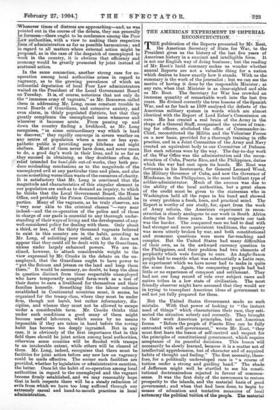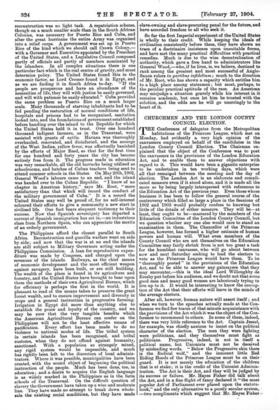THE AMERICAN EXPERIMENT IN IMPERIAL RECONSTRUCTION. T HE publication of the
Reports presented by Mr. Root, the American Secretary of State for War, to the President gives us the history of the last five years of American history in a succinct and intelligible form. It is not our English way of doing business ; but the reading of Mr. Root's lucid summary makes us wonder whether annual Reports are not a valuable thing for a. nation which desires to know exactly how it stands. With us the summary is the work of the journalist ; but we can see the merits of having it done by the responsible Minister ; at any rate, when that Minister is as clear-sighted and able as Mr. Root. The Secretary for War has crowded an immense quantity of remarkable work into the last five years. He divined correctly the true lessons of the Spanish 'War, and as far back as 1899 analysed the defects of the American military system in words which are almost identical with the Report of Lord Esher's Commission on ours. He has created a. real brain of the Army in the shape of a General Staff, reorganised the system of train- ing for officers, abolished the office of Commander-in- Chief, reconstituted the Militia and the Volunteer Forces on a new basis, provided for a thorough training in rifle practice, and in a Joint Committee of the Army and Navy created an equivalent body to our Committee of Defence. But such reforms were by the way. The day-to-day work of the War Office was the administration and the recon- struction of Cuba, Puerto Rico, and the Philippines, duties which the war had cast upon its bands. Mr. Root was fortunate in his lieutenants, for General Leonard Wood, the Military Governor of Cuba, and now the Governor of Mindanao, in the Philippines, is the most brilliant type of soldier-administrator. Much of the success was due to the ability of the local authorities, but a great share of the credit must be given to the statesman who in Washington held all the ropes in his hand and showed in every problem a fresh, keen, and practical mind. The Report is worthy of our study, for, apart from the work of Army reform, the American experiment in recon- struction is closely analogous to our work in South Africa during the last three years. In most respects our task was the harder. The conquered race we had to deal with had stronger and more persistent traditions, the country was more utterly broken by war, and both constitutional and economic questions were more far-reaching and complex. But the United States had many difficulties of their own, as in the awkward currency question in the Philippines, and their problem had two elements of perplexity which weie foreign to ours. An Anglo-Saxon people had to resettle what was substantially a Latin race, an experiment which we have never had to make in quite the same form. Again, the conquering people had had little or no experience of conquest and settlement. They had not our long record of rule over subject races and native tribes in a low state of civilisation. The most friendly observer might have assumed that they would err in trying to transplant American ideas of government to soil not yet fully prepared for them.
But the United States Government made no such mistake. With that power of looking to "the instant need of things" which characterises their race, they esti- mated the situation soberly and correctly. They brought to their work American principles, but not American forms. "Before the people of Puerto Rico can be fully entrusted with self-government," wrote Mr. Root, "they must first learn the lesson of self-control and respect for the principles of constitutional government, which require acceptance of its peaceful decisions. This lesson will necessarily be slowly learned, because it is a matter not of intellectual apprehension, but of character and of acquired habits of thought and feeling." The first necessity, there- fore, for a politically undeveloped race is "a course of tuition under a strong and guiding hand." The shade of Jefferson might well be startled to see his consti- tutional doctrinairedom rejected in favour of common- sense. It was the first duty of the newcomers to restore prosperity to the islands, and the material basis of good government; and when that had been done, to begin by means of education and tentative measures of local autonomy the political tuition of the people. The material reconstruction was no light task. A repatriation scheme, though on a much smaller scale than in the South African Colonies, was necessary for Puerto Rico and Cuba, and after the great hurricane the entire Army was organised into a relief corps. A government was set up in Puerto Rico of the kind which we should call Crown Colony,— with a Governor and Executive appointed by the President of the United States, and a Legislative Council composed partly of officials and partly of members nominated by the islanders. In all complex situations there is one particular fact which is the real centre of gravity, and must determine policy. The United States found this in the economic factor, as Lord Cromer found it in Egypt, and as we are finding it in South Africa to-day. "If the people are prosperous and have an abundance of the necessities of life, they will with justice be easily governed, and will with patience be easily educated." Cuba provided the same problem as Puerto Rico on a much larger scale. Many thousands of starving inhabitants had to be fed pending the restoration of normal conditions of life, hospitals and prisons had to be reorganised, sanitation looked into, and the foundations of government established before handing over the island to the Republic for which the United States held it in trust. Over one hundred thousand indigent farmers, as in the Transvaal, were assisted with grants of cattle. Havana was thoroughly overhauled, renovated, and disinfected, and the scourge of the West Indies, yellow fever, was effectually banished by the efforts of Major Reed, so that for the first time for one hundred and forty years the city has become entirely free from it. The progress made in education was very remarkable, all the old barracks being utilised as schoolrooms, and batches of Cuban teachers being sent to attend summer schools in the States. On May 20th, 1902, General Wood's labours came to an end, and the island was handed over to the Cuban Republic. "I know of no chapter in American history," says Mr. Root., "more satisfactory than that which will record the conduct of the military government of Cuba." It is a record the United States may well be proud of, for no self-interest coloured their efforts to give a community a new start in civilised life. One fact bears eloquent testimony to their success. Now that Spanish sovereignty has departed a current of Spanish immigration has set in,—an industrious class from Northern Spain, who can appreciate the merits of an orderly government.
The Philippines afford the closest parallel to South Africa. Reconstruction and guerilla warfare went on side by side ; and now that the war is at an end the islands are still subject to Military Governors acting under the Philippines Commission. A loan for reproductive expen- diture was made by Congress, and charged upon the revenues of the islands. Railways, as the chief means of economic development and the most efficient weapon against savagery, have been built, or are still building. The wealth of the place is found in its agriculture and forestry, and the United States have brought to bear upon them the methods of their own Agricultural Bureau, which for efficiency is perhaps the first in the world. It is pleasant to read of the means taken to preserve the great forest wealth, and to ensure improvement and diversity in crops and a general instruction in progressive farming. Irrigation in Egypt did more than anything else to establish the peace and loyalty of the country, and we may be sure that the very tangible • benefits which the American Agricultural bureau can confer on the Philippines will not be the least effective means of pacification. Every effort has been made to do no violence to national modes of life. The tribal system in certain islands has been recognised, and tribal customs, when they do not offend against humanity, sanctioned. With a population so strangely mixed, any rigid system would be impossible, and much has rightly been left to the discretion of local adminis- trators. Where it was possible, municipalities have been created, with the sound object of beginning the political instruction of the people. Much has been done, too, in education ; and a desire to acquire the English language is as widely marked in the Philippines as in the farm schools of the Transvaal. On the difficult question of slavery the Government have taken up a wise and moderate line. They have made no attempt to break down whole- sale the existing social conditions, but they have made So far the first Imperial experiment of the United States is wholly to their credit. While keeping the ideals of civilisation consistently before them, they have shown no trace of a doctrinaire insistence upon unsuitable forms, and have met the many practical difficulties with practical remedies. Much is due to the wise decentralisation of authority, which gave a free hand to administrators like General Wood,—who, if he lives, is, we believe, destined to rank among the greatest and most successful of Anglo- Saxon rulers in partibus infidelium ; much to the direction of Mr. Root, who has shown a capacity which entitles him to a high place among statesmen ; but most, perhaps, to the peculiar practical aptitude of the race. An American may misjudge a situation gravely while his interest in it remains academic, but once let him be trusted with the solution, and the odds are he will go unerringly to the heart of it.











































 Previous page
Previous page